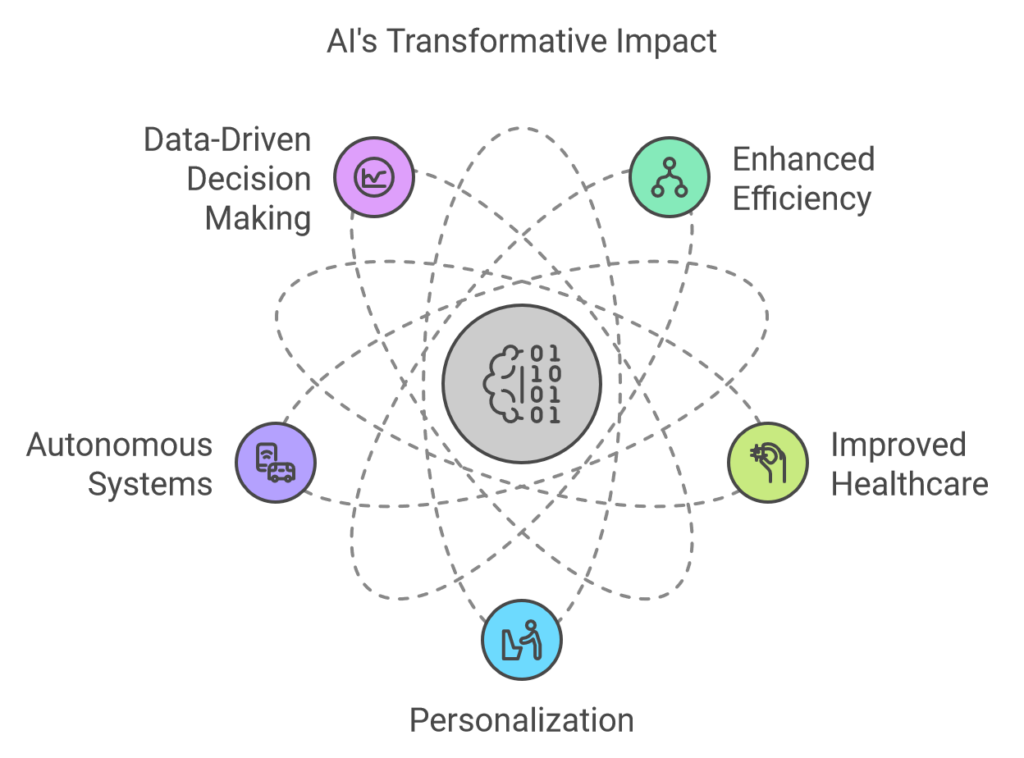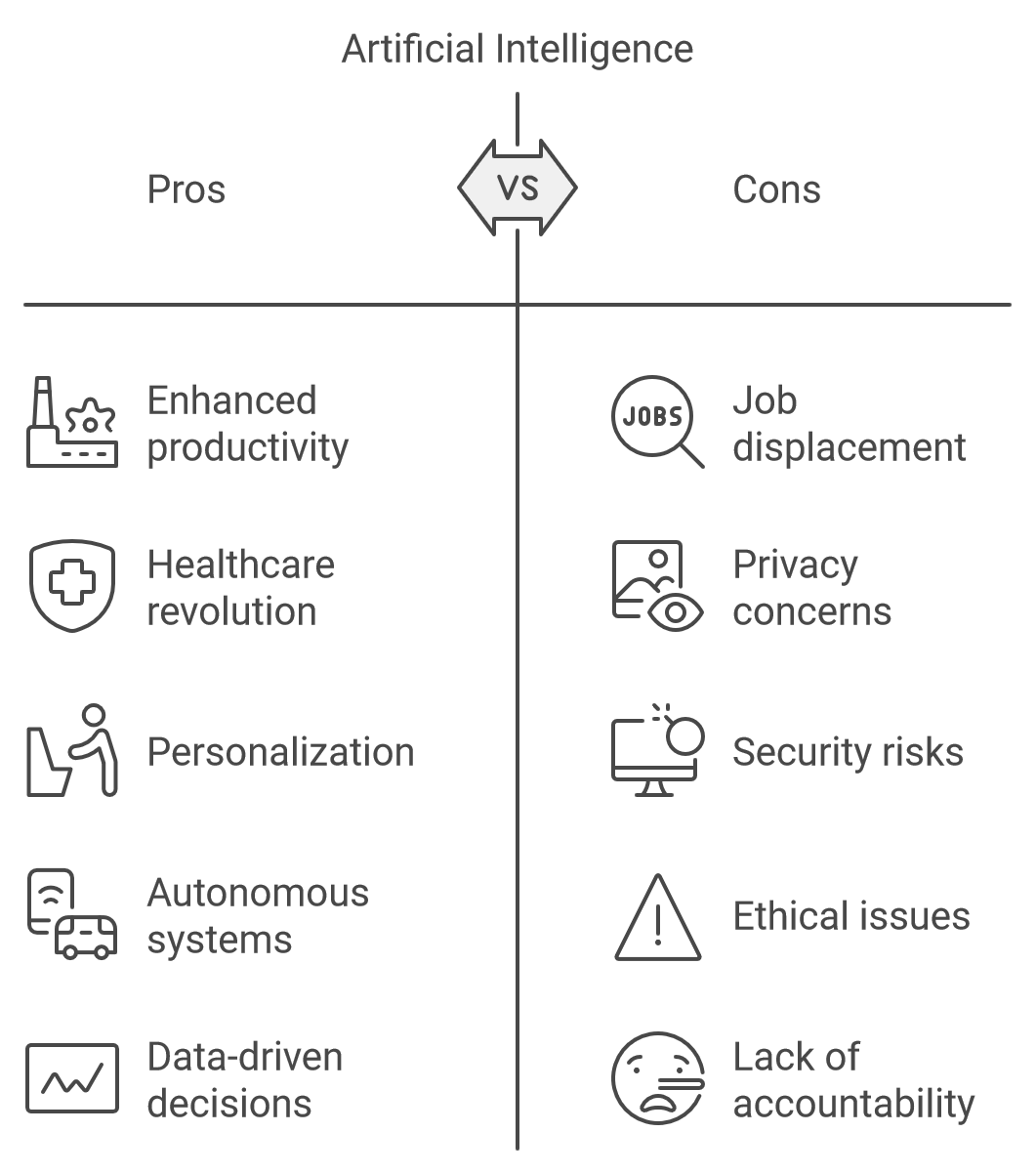Artificial intelligence (AI) has emerged as one of the most transformative technologies of our time. From enhancing productivity to revolutionizing healthcare, AI is reshaping industries and creating new possibilities for businesses, governments, and individuals. However, with great opportunity also comes significant risk. AI’s rapid development brings ethical, economic, and social challenges that require careful consideration and responsible action.
In this blog post, we’ll explore the opportunities that AI presents, the potential threats it poses, and what we can do to ensure a balanced, beneficial AI future.
Opportunities Presented by Artificial Intelligence
The potential of AI is immense, and its applications span a broad spectrum of industries. By automating repetitive tasks, providing predictive insights, and augmenting human abilities, AI is unlocking new levels of efficiency, innovation, and convenience.
1. Enhanced Efficiency and Productivity
AI’s ability to process vast amounts of data at high speeds allows businesses to operate more efficiently than ever before. Through machine learning and automation, companies can optimize processes, reduce human error, and focus human resources on higher-value tasks.
- Example: AI-powered chatbots can handle customer service inquiries, reducing wait times and providing 24/7 support. In sectors like logistics, AI algorithms are used to optimize delivery routes, saving time and fuel.
2. Improved Healthcare Outcomes
AI is revolutionizing healthcare by enhancing diagnostic accuracy, predicting disease outbreaks, and personalizing treatment plans. Machine learning algorithms can analyze medical images with remarkable precision, enabling faster and more accurate diagnoses of conditions like cancer and heart disease.
- Example: IBM Watson is being used to assist doctors in diagnosing diseases and recommending treatments by analyzing vast amounts of medical data, helping healthcare providers make informed decisions.
3. Personalization in Consumer Experiences
AI enables companies to offer personalized recommendations, enhancing customer satisfaction and loyalty. By analyzing user data, AI can suggest products, movies, or music that align with an individual’s preferences.
- Example: Netflix and Spotify leverage AI to recommend content based on user behavior, creating a tailored experience that increases engagement and retention.
4. Advancements in Autonomous Systems
AI is at the heart of autonomous systems, from self-driving cars to drones. These innovations have the potential to revolutionize industries like transportation, delivery, and agriculture, making operations safer, more efficient, and more sustainable.
- Example: Companies like Tesla and Waymo are working on autonomous vehicles, which could reduce traffic accidents, decrease emissions, and change the landscape of urban transportation.
5. Data-Driven Decision Making
In today’s data-centric world, AI helps organizations make informed, data-driven decisions. Through predictive analytics, companies can forecast trends, understand customer behavior, and make proactive business choices.
- Example: Retailers use AI to analyze sales data, seasonal trends, and inventory levels, enabling them to make smarter decisions about stock, pricing, and marketing.

Threats Posed by Artificial Intelligence
While the opportunities AI presents are impressive, it also poses serious risks. The rapid adoption of AI has raised concerns about ethical implications, job displacement, privacy, and security.
1. Job Displacement and Economic Inequality
One of the most significant concerns surrounding AI is its impact on employment. As AI continues to automate tasks, certain jobs, particularly those involving repetitive or routine work, are at risk of becoming obsolete. This could lead to job displacement and widen the gap between those who can work with AI and those who are replaced by it.
- Example: Automated systems in manufacturing, like robotic assembly lines, reduce the need for human labor in production, raising concerns about the future of factory jobs.
2. Privacy and Surveillance Concerns
AI-driven surveillance systems can process vast amounts of data to track individuals, raising serious privacy concerns. With the rise of facial recognition and data tracking technologies, there is an increased risk of violating individuals’ privacy rights and enabling mass surveillance.
- Example: In some countries, facial recognition technology is used extensively for surveillance purposes, sparking debates over privacy and the potential for abuse by authoritarian governments.
3. Security Risks and Deepfakes
As AI becomes more advanced, it can also be exploited for malicious purposes. One notable threat is the use of deepfake technology to create highly realistic but fake images, audio, and videos. These deepfakes can be used to spread misinformation, damage reputations, or even influence elections.
- Example: Deepfake videos of prominent figures have already surfaced online, blurring the line between reality and fabrication, creating new risks for public trust in media.
4. Ethical and Bias Issues
AI systems are only as good as the data used to train them. If training data contains biases, AI systems may produce biased or unfair results. This can lead to discrimination in areas like hiring, lending, and law enforcement.
- Example: AI-driven hiring systems may inadvertently favor certain demographic groups if trained on biased data, leading to unequal opportunities and reinforcing societal biases.
5. Lack of Accountability and Transparency
Many AI algorithms operate as “black boxes,” meaning it’s difficult to understand how they reach specific decisions. This lack of transparency can be problematic, particularly in areas like healthcare, finance, and criminal justice, where AI-driven decisions can have life-altering consequences.
- Example: In some cases, AI systems used in the criminal justice system to assess bail eligibility have been criticized for being opaque and difficult to challenge.
Balancing AI’s Opportunities and Threats
To fully realize the potential of AI while mitigating its risks, a balanced and responsible approach is essential. Policymakers, businesses, and individuals all play a role in ensuring that AI develops in a way that benefits society.
1. Establishing Ethical Guidelines and Regulations
Governments and organizations are beginning to establish ethical guidelines for AI use, aiming to address issues related to privacy, security, and fairness. Regulations such as the EU’s General Data Protection Regulation (GDPR) and proposed AI frameworks are crucial steps in setting boundaries for responsible AI use.
- Example: The EU’s proposed Artificial Intelligence Act aims to regulate AI based on the level of risk posed, with stricter requirements for high-risk applications like biometric identification.
2. Encouraging Transparency and Explainability
Transparency is essential in AI to build trust and ensure accountability. Companies should invest in AI models that are interpretable and provide explanations for their decisions, especially when they impact critical areas like finance, healthcare, and justice.
3. Promoting Reskilling and Education
As AI reshapes the job market, governments and businesses need to invest in reskilling programs to help workers transition to new roles. Education systems should also adapt to equip students with the skills needed to work alongside AI, emphasizing fields like data science, machine learning, and ethics in technology.
4. Ensuring Security and Privacy Protection
AI developers and businesses must prioritize security and privacy to protect users from potential risks. This includes using privacy-preserving technologies like differential privacy and building AI systems that are robust against cyber threats.
5. Fostering Public Awareness and Participation
AI impacts everyone, and fostering public awareness of its benefits and risks is essential for a balanced approach. Encouraging open discussions on AI and involving the public in decision-making processes can help shape AI in ways that align with societal values.
Conclusion
The rise of artificial intelligence marks one of the most transformative shifts in recent history, bringing with it incredible opportunities for innovation and progress. AI has the power to make businesses more efficient, improve healthcare, and enhance everyday experiences. However, with these benefits come significant risks, from job displacement to ethical concerns and privacy threats.
By promoting responsible practices, developing robust regulations, and fostering a culture of transparency and accountability, we can leverage AI’s potential while safeguarding against its downsides. As we look toward the future, it’s crucial to strike a balance—one that allows us to reap the rewards of artificial intelligence while protecting society and creating a fair, equitable, and sustainable world.
